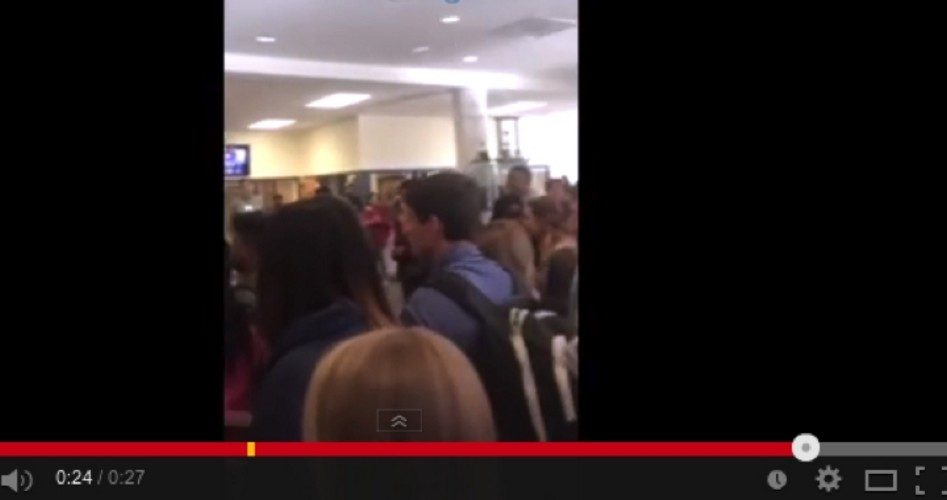
Deputy Ben Fields has been condemned in the media and called names. He has been fired from the Richland County Sheriff’s Department. And the federal government has launched a civil-rights investigation into his apprehension of a defiant student who was disrupting her class last Monday. Yet some of the people who know him best are rallying on his behalf: students at Spring Valley High School in Columbia, South Carolina, where Fields was the school resource officer.
On Friday, approximately 100 students walked out of class at around 10:00 a.m. to protest the termination of Fields. They were back in their classrooms after about 10 minutes in response to a diplomatic request from their principal, but not before their voices were heard. Reports the Daily Mail:
Pupils said they wanted to support the cop and help protect his reputation as they marched out of classes on Friday.
Students chanted the cop’s name and wore shirts which said “Free Fields” and “Bring Back Fields.”
They did not return to classes until principal Jeff Temoney arrived, saying he had respectfully listened to their protest and expected the students to get back to lessons.
Senior London Harrell was among Fields’ supporters and told WLTX: “We just want to show that we’re still supporting him and that he’s still a good guy.”
The events leading to Fields’ problems began when an unnamed 16-year-old girl at Spring Valley High was being disruptive and then defied both a teacher and administrator who ordered her to leave class. Deputy Fields was then called to the scene, yet she refused to comply with his commands as well, leaving him no choice but to enforce compliance via physical means. The girl now faces a charge of “disturbing schools.”
Three videos of the event were taken by students. One of them went viral Tuesday and — with the public seeing only the physical force but not what precipitated it — created an outcry, with government officials calling Fields’ actions “outrageous,” “reprehensible,” and “shamefully shocking.” But what many Spring Valley students find shocking is that the deputy was fired based on what they consider an unfair accusation.
The protesters, a mix of both white and black students, said they would also show support for Fields at last Friday night’s Spring Valley football game. And feelings for the officer were strong. As London Harrell also said, reports WISTV, “He was a great guy. He protected us and everything. He was our school resource officer. We always could depend on him and everything. Every time I saw him, he was always joking around with people. It was never like ‘Oh, I’m about to body slam you.'”
These sentiments were shared by senior John Cassibry, who said the students’ message was that Fields “was being unfairly accused.”
Furthermore, they want the deputy back in the school, Harrell related. And while she acknowledged that this probably wouldn’t happen, she said, “We don’t want his reputation to be ruined” and “I want him to at least get his job back.”
Fields’ reputation and job, however, for now have been lost based on what some would describe as a lynch-mob-like reaction. There are many, for instance, who judge the officer harshly because they don’t believe he belonged in the school in the first place. And of course, things were different in bygone days. Not only were students less likely to brashly defy authority, but teachers and administrators would have handled the situation “in house.” But a certain factor is sometimes overlooked when considering this:
They had the power to do so.
It’s not that physical force wasn’t used years ago, but that teachers and administrators were the ones effecting it — and that we didn’t have video showing only the ugliness of the force (physical compulsion is seldom pretty) but not the ugliness that precipitated it. But now America, with its anti-spanking mentality, has disempowered teachers and, to an extent, parents. Yet this doesn’t change the fact that physical force is sometimes necessary. Some would reflexively dispute this, but if their thesis is correct, why allow police to use force in any situation? And if it is necessary to use it at times against adults, how can one think force wouldn’t sometimes be necessary with the less morally mature beings known as minors?
Obviously, allowing the violation of just laws, whether by adults or teens, leads to social breakdown. But here’s the rub: If force is sometimes necessary but removed from the repertoire of teachers and administrators, who is left to step into this breach?
The police.
This explains, mind you, why there have been incidents in which cops were called to subdue defiant 10-year-olds.
Of course, even if teachers (and many parents) didn’t have to fear laws and lawsuits, American society has become so soft and effete that force is often unthinkable to us. This is a major reason why people are so shocked when they see it on video. Yet there’s something we should ponder regarding this phenomenon, courtesy of philosopher G.K. Chesterton (note that it applies to police, too):
The professional soldier gains more and more power as the general courage of a community declines. Thus the Praetorian Guard became more and more important in Rome as Rome became more and more luxurious and feeble. The military man gains the civil power in proportion as the civilian loses the military virtues.
If we so lose the military virtues that physical force becomes anathema to us, we shouldn’t be surprised when the police are militarized — and are introduced into more and more aspects of our lives. For what society will not do for itself, government will do for it.
Yet none of this changes the facts of Deputy Fields’ case, which are as follows:
• He didn’t ask to be stationed at Spring Valley High; he was assigned to it.
• He didn’t ask to be called to the defiant girl’s class last Monday; he was answering a call of duty.
• He didn’t decide to remove the girl; others made that decision and, unable and unwilling to enforce compliance, called on him to do so.
• The “third video,” said Richland County sheriff Leon Lott, clearly showed the girl swinging at Fields’ head after he initiated physical contact.
Also note that Sheriff Lott said Fields “had the right to put his hands on the student,” reported USA Today. So why was he fired? Lott said that he violated procedures when he lost control of the girl by letting go of her and sliding her a few feet across the floor.
This is why some would say that in this event Deputy Fields is the victim — of a politically correct lynch mob. A minor alleged misstep, which amounted to a second or less of the encounter and which at most would warrant a reprimand, has cost the officer his job.
And it’s why some critics would conclude that Sheriff Lott has acted cowardly, destroying an officer’s career and reputation in an effort to preserve his own. As for preserving order, we might wonder how this will be possible if a policeman can lose his job just for doing his job.



